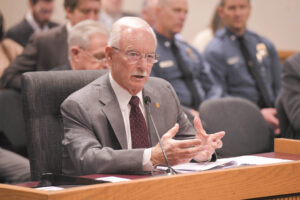5:45
News Story
Formerly incarcerated Missourians struggle for decades to find stable housing
More than 13,000 people left Missouri prisons last year. Their criminal records could keep them from finding housing for the rest of their lives
This story was originally published by The Kansas City Beacon.
After serving time in prison, Christine McDonald found herself living on the streets of Kansas City and in a pay-by-the-week motel. Robert Richardson, who also has a felony record, settled for a bug-infested apartment with an open hole in the front.
They are far from alone in the struggle to find adequate, affordable housing as an ex-offender. Many people with felony convictions search for years and even decades to find a stable, sanitary place to live.
Some people returning from prison are fortunate to have family members who can provide housing or rent apartments for them. Others find temporary shelter at halfway houses. But ex-offenders who are on their own often submit hundreds of applications for apartments, only to receive just a couple of responses. And the apartments they do find often have bug infestations or nonfunctional utilities.
An ordinance passed by the Kansas City Council in 2018 makes it illegal for prospective landlords or employers to ask applicants if they have a felony conviction. But advocates say the law hasn’t removed the obstacles, especially for ex-felons whose past crimes are readily found on the internet.
With 13,214 people released from prison last year in Missouri, and 4,179 in Kansas, the enduring discrimination leaves hundreds of people desperate for shelter in a housing market where rising rents are displacing tenants with jobs and clean records.
A 2018 study by the Prison Policy Initiative found that formerly incarcerated people are about 10 times more likely to experience homelessness than the general population.
The difficulties are especially acute for people of color. In Missouri, for instance, Black people are almost five times as likely to be incarcerated than white people. The rate of homelessness is also higher for formerly incarcerated Black people than for formerly incarcerated white people, according to the same 2018 study.
Search for housing with a felony record
Richardson was incarcerated for nine years in Kansas and Missouri prisons. Upon his release six years ago, he realized that his conviction would follow him for the rest of his life.
At first, Richardson was able to find an apartment through a family connection. He still feels fortunate to have found temporary housing, even if it was in rural Missouri, far from his partner and children in Kansas City. He lived there for two years, while he submitted dozens of apartment applications in Kansas City.
All but one were rejected when landlords learned that he was formerly incarcerated and did not yet have a job in the city.
“I thought things would be over, and I would be able to start rebuilding when I got out,” Richardson said. “And, frankly, I’ve just been kind of stagnant … I don’t know how to get from where I am back to anything that resembles a normal life. I can’t see a path forward, even six years later.”
Eventually, he found a “fairly notorious slumlord” who was willing to overlook his record and rent a small apartment in the city.
This apartment was not ideal — there were bedbugs and cockroaches, and someone had crashed a car into the front of the building, leaving a giant hole patched up with plywood. But it was near his family, so he moved in and worked on finding a job.
He now lives in a trailer in Kansas City, Kansas, which he bought from a friend.
Additional barriers
McDonald also struggled to find employment upon her release from prison in 2004. She is a victim of sexual abuse and entered the criminal justice system at a young age. Following her release from prison, she was unhoused and had no choice but to live on the streets of Kansas City.
McDonald only received a seventh grade education prior to her imprisonment. She couldn’t read, so she had someone else fill out job applications for her and eventually found a job for minimum wage at a fast food restaurant.
But after suffering from pregnancy complications that left her unable to see, she was no longer able to work and had few options left for employment.
“If I was just a felon, I would get one of the typical jobs a felon gets, which is fast food or warehouse. Those are more apt to hire you than somebody else,” McDonald said. “But if you have a disability, fast food or warehouse jobs are automatically off the table.”
Her son’s father was still able to work, so he paid rent at a pay-by-the-week hotel while she worked on her education. McDonald has earned her a GED and now works as an author, a community organizer and advocate for survivors, like herself, who were coerced into sexual exploitation.
“We just want jobs and to pay taxes and to live in reasonably habitable, sanitary housing like everybody else,” she said. “It’s awful. It’s absolutely discriminatory against people with felony convictions.”
Legal housing protections
In 2018, Kansas City passed a municipal measure called “Ban the Box,” which prevents prospective employers and landlords from asking applicants directly if they have a felony record, or from rejecting applicants solely for that reason.
But advocates say that the ordinance, while an important statement, is not enforced. Felony convictions almost always come up in a background check, and there is little to stop landlords from rejecting an applicant if they discover one.
“The city doesn’t have in place the mechanisms necessary to hold that landlord accountable or to investigate the situation,” said Gina Chiala, the executive director of the Heartland Center for Jobs and Freedom. “So right now, it’s basically a public policy, but not an enforceable law.”
The Heartland Center is a nonprofit organization that helps workers maximize their job opportunities in order to create economic freedom for people of all backgrounds. The center provides legal advice and representation to tenants and employees.
Richardson said he discloses his felony record on most applications in order to preempt a criminal background check.
“Ban the Box gets people to where they can at least have the conversations and hear that denial directly, rather than always wondering if they even read it,” he said. “It’s a nice thought, but it only goes a tiny distance.”
Channeling anger into action
Before his felony conviction, Richardson worked as a biologist for a state health department. He collected chemical samples of endangered species for analysis.
During the nine years he was in prison, new technologies were developed and he quickly fell behind on the current scientific research, Richardson said. On top of that, scientific organizations often need employees who can be on a “secure list” with security clearance, which excludes most people with a felony record.
When he realized his job search would be difficult, he sought help from Second Chance Risk Reduction Center in Kansas City, an organization that contracts with the Missouri Department of Corrections to find housing and employment for the formerly incarcerated.
Lead resource specialist Brittany Peterson said that Second Chance’s aim is to reduce recidivism and help those with a felony record rebuild their lives outside of prison.
“[Employment] is one of the largest needs in helping someone to reestablish themselves back in the community, and to be able to provide for their family, whether it’s family reunification, providing for their children, or just providing for themselves,” she said.
She said that having reliable income is essential before the formerly incarcerated can find permanent housing.
Richardson said he eventually decided that, with the costs required for medical care related to an HIV diagnosis and post-traumatic stress disorder, his best financial path is to limit his work hours and rely on disability assistance.
Now, he finds a purpose in political activism. After spending so much time in a criminal justice system that treated him “like an animal who can’t behave otherwise,” he found compassion in groups like KC Tenants, a union that advocates for the rights of renters.
Connecting with this group gave him a path forward, Richardson said.
“Get active with the groups of change,” he said. “The thing that really turned it around for me is when I started fighting back. Actively fighting alongside these groups that change things for the better makes a big difference.”
The Kansas City Beacon is an online news outlet focused on local, in-depth journalism in the public interest.
Our stories may be republished online or in print under Creative Commons license CC BY-NC-ND 4.0. We ask that you edit only for style or to shorten, provide proper attribution and link to our website. AP and Getty images may not be republished. Please see our republishing guidelines for use of any other photos and graphics.





